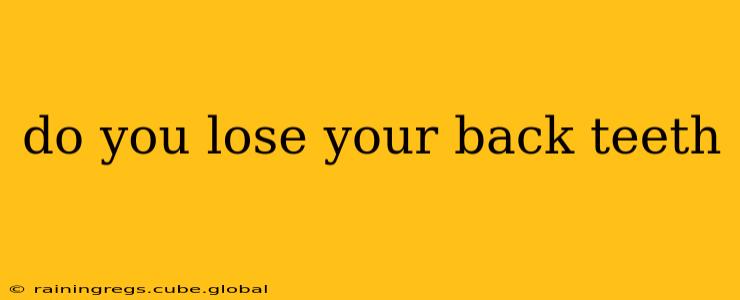Do You Lose Your Back Teeth? Understanding Wisdom Teeth and Other Posterior Tooth Loss
The simple answer is: yes, you can lose your back teeth, but it's not as straightforward as losing your baby teeth. While the loss of back teeth (molars and premolars) isn't a natural, predetermined part of aging like losing baby teeth, several factors can lead to their loss. This article will delve into the reasons why you might lose your back teeth, exploring common causes and preventative measures.
What Causes Back Tooth Loss?
The primary reasons for losing back teeth are:
-
Periodontal Disease (Gum Disease): This is the most common culprit. Gum disease is an infection of the gums that, if left untreated, can destroy the bone and tissues supporting your teeth, ultimately leading to tooth loss. Symptoms include bleeding gums, red or swollen gums, and persistent bad breath. Regular dental checkups and good oral hygiene are crucial for prevention.
-
Dental Caries (Cavities): Untreated cavities can progress and cause significant damage to the tooth structure. If the decay reaches the tooth's pulp (the inner part containing nerves and blood vessels), it can lead to an infection and necessitate a root canal or extraction. Regular brushing, flossing, and professional cleanings are essential for preventing cavities.
-
Trauma: Accidents, injuries, or impacts to the mouth can damage or fracture back teeth, sometimes requiring extraction. Wearing a mouthguard during sports can help protect your teeth.
-
Wisdom Teeth: These third molars often erupt later in life and can become impacted (unable to fully emerge), causing pain, infection, and potential damage to adjacent teeth. Extraction is often recommended to prevent these complications.
-
Grinding or Clenching (Bruxism): Habitual grinding or clenching of teeth puts excessive stress on the jaw and teeth, increasing the risk of wear and tear, fractures, and ultimately, tooth loss. A nightguard can help mitigate the effects of bruxism.
What about losing your back teeth like you lose baby teeth?
Unlike baby teeth, which are designed to be replaced by permanent teeth, your adult molars and premolars don't have a natural replacement mechanism. Losing these teeth requires intervention, such as dental implants, bridges, or dentures, to restore function and aesthetics.
How can I prevent losing my back teeth?
The best way to prevent back tooth loss is through proactive oral hygiene and regular dental visits. This includes:
- Brushing twice daily with fluoride toothpaste: Focus on proper technique to remove plaque and food particles effectively.
- Flossing daily: Removes plaque and food particles from between teeth where your toothbrush can't reach.
- Regular dental checkups and cleanings: Allows your dentist to detect and address potential problems early on.
- Maintaining a healthy diet: A balanced diet reduces the risk of nutritional deficiencies that can affect oral health.
- Managing stress: Stress can exacerbate bruxism, so finding healthy ways to manage stress is important.
Are there different types of back teeth?
Yes, the back teeth are classified as premolars (bicuspids) and molars. Premolars have two cusps (points) and are involved in chewing and grinding food. Molars have three or more cusps and play a significant role in grinding food. Wisdom teeth are the third molars.
At what age do people typically lose their back teeth?
There's no single age at which people lose their back teeth. It depends heavily on individual oral hygiene practices, genetics, and lifestyle factors. Some people might maintain all their back teeth throughout their lives with proper care, while others may experience tooth loss at a much younger age due to untreated dental problems.
By understanding the causes of back tooth loss and adopting good oral hygiene practices, you can significantly reduce your risk and preserve your natural teeth for a lifetime. Remember, regular visits to your dentist are essential for maintaining optimal oral health and preventing tooth loss.
